|
Lab Microbial Systems Ecology
|
||
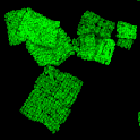

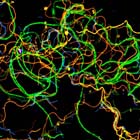
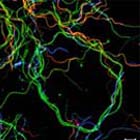
International course on FISH and other in situ detection tools
Introduction: A major limitation for understanding the microbiology in the environment is our limited knowledge of the micro-organisms and their activities, because the majority of these organisms has not yet been cultured. During the last decades, a plethora of different techniques based on molecular and radioactive markers have become available that provide increased possi-bilities to detect microorganisms that have not yet been cultured and trace their activities in situ. This international course aims to teach and discuss current state-of the art in situ detection techniques and future developments for innovative applications in different types of microbiological samples.
Next FISH courses in 2015 and 2016: Please contact Natuschka Lee nlee<at>microbial-systems-ecology.de.
Background and layout of course: Since the development of the fluorescence in situ hybridization (FISH) technique based on rRNA-targeted nucleic acid probes in the 1980-90s, cultivation-independent identification and quantification of microbial cells in the environment have provided powerful possibilities for advanced ecological in situ studies (see e.g. Wagner and Haider, 2012 in Current Opinion in Biotechnology; and by Lee et al, 2011, in Encyclopedia of Geobiology, Springer Verlag). However, several difficulties have been encountered when applying these techniques on different organisms and environmental systems. To circumvent these problems, the standard FISH technique has either been combined with other methods, such as cell-sorting, microautoradiography, electron microscopy, RAMAN spectroscopy or nano SIMS; or further developed and refined with respect to signal detection or probe chemistry, such as CARD-FISH, clone-FISH, LNA-FISH, mRNA-FISH, PNA-FISH, polynucleotide probes, RING-FISH or DOPE-FISH. The aim of this course is to give a theoretical overview of different kinds of FISH techniques and applications, and some lab experiences on a selected amount of these techniques:
- Overview on methods in molecular and microbial ecology, biotechnology (including food and medical fields) and geobiology.
- Standard-FISH, addresses principles and trouble shooting approaches on FISH using oligonucleotide probes targeting ribosomal genes in prokaryotes and eukaryotes.
- Advanced-FISH, addresses different types of advanced FISH techniques (targeting both ribosomal as well as other low copy genes such as functional genes).
- FISH applications on specific habitats deals with the various problems encountered in different habitats. In addition to this, other molecular and analytical technqiues (e.g. qPCR, genomics, stable isotope based tools) will also be addressed.
- Microscopy for FISH, such as confocal laserscanning microscopy and digital image analysis.
- Bioinformatic tools for construction of databases, phylogenetic analyses and probe/primer design (in particular arb).
- Seminars from course participants on individual projects and experiences from the lab course for constructive discussions on which FISH technique is appropriate for their project.
- Lenght: ≥ 4-5 full days (corresponds to ~3 credits according to the EU education system), with the possibility to stay longer for complementary studies on own samples.
- Composition: ~15 h theory, ~25 h lab (including computer work). Lab applications are made on reference samples as well as upon wish on own samples (~2, but more are possible in connection with a longer stay).
- How to qualify: Anyone with a scientific background can participate (e.g. biologists, chemists, engineers, geologists). The course always starts with a basic overview of fmicrobial ecology and molecular biology, and will then move upwards to advanced FISH issues. Suitable for undergradutes, graduates, postdocs and researchers.
- Course fee: 900 Euro (for academia), and includes lectures and expenses for the practical part of the course. Reduced fees can be obtained after negotiation (e.g. via collaboration).
- Comment: A special adapted course or single services can be offered to meet specific demands.
- Click here for a folder about the course.
Location(s) of the FISH course:
The course is normally organised at the department of microbiology, TUM, in Freising (outside Munich, Germany). However, the course can also be leased to other institutes.
Benefits:
- More persons from the own and neighbour research facilities can participate at the FISH course at a lower cost (lower course fee as well as less expenses for travel costs).
- We help you to set up/evalute facilities for FISH experiments in your own lab.
| Examples of former locations and host institutes: |
Location:
|
|
  |
Department of Microbiology TUM, Lab Microbial Systems Ecology. Course organiser: Dr. N. M. Lee (nlee<at>microbial-systems-ecology.de). | Freising (near Munich), Germany
|
|
|
||
  |
VTT Technical Research Centre Finland, in collaboration with Department of Applied Chemistry and Microbiology Helsinki University. Course organisers: Dr. M. Itävaara and Dr. N. M. Lee (nlee<at>microbial-systems-ecology.de). | Espoo (near Helsinki), Finland
|
|
|
||
 |
NIOZ Royal Netherlands Institute for Sea Research. Course organisers: Sarah L. Engelhard, Dr. F. Meysman and Dr. N. M. Lee (nlee<at>microbial-systems-ecology.de). | Yerseke (near Ant-werpen), Holland
|
|
|
||
This course has been organised regularly since 2006, for undergraduates,graduates and senior researchers, from different academic research fields and industry (aquatic biology, astrobiology, bioremedation, biotechnology, environmental microbiology, food microbiology, geobiology, medical microbiology, microbial ecology, soil ecology) and nearly 40 different countries in Europe, North America, South America, Middle East, Russia, China, India and Japan. Upon wish and availability, we also invite special guest lectures to our courses, e.g.:
- AdvanDx PNA-FISH technology (USA);
- Ametek/CAMECA (nanoSIMS technology, Germany);
- Dr. Gesche Braker (Max Planck Institute Marburg, Germany);
- Dr. Martin Elsner (Environmental Isotope Chemistry, Groundwater Ecology, Helmholtz Center, Germany)
- Dr. Johannes Fried (Eukaryote microbiology,TUM, Germany);
- Dr. Bernhard Fuchs (Molecular Microbiology, Max Planck Institute Bremen, Germany);
- Prof. Dr Frank O. Glöckner (Metagenomics and bioinformatics (the SILVA tool, Max Planck Institute Bremen, Germany);
- Dr. Christian Griebler (Microbial Ecology, Groundwater Ecology, Helmholtz Center, Germany);
- Dr. Harald Meier (arb bioinformatics group TUM, Germany);
- Prof. Dr. Frank E. Loeffler (Bioremediation, UTK, Knoville TN (former Georgia Institute of Technology, Atlanta, GA, USA);
- Implen GmbH (Munich, Germany);
- Dr. Wolfgang Ludwig (Microbiology/arb bioinformatics TUM, Germany);
- Dr. Tillmann Lüders (Molecular Ecology, GGroundwater Ecology, Helmholtz Center, Germany);
- Dr. Michael Rothballer (Helmholtz Zenter Munich Plant-microbe interactions, Germany);
- Dr. Michael Schmid (Helmholtz Zenter Munich Plant-microbe interactions,Germany);
- Zeiss Microimaging GmbH.
Click here for images from former FISH courses.
For other FISH courses or services on other locations, here some links:
- FISH course at University of Vienna, Austria
- FISH and arb courses at Max Planck Institute Bremen, Germany
- FISH consulting company, Vermicon, Munich, Germany
- FISH course in Perugia, Italy
- FISH course at the University of Queensland, Brisbane, Australia
- FISH course (part of a larger programme) at University of Stanford, CA, USA
- FISH course in medical fields, see e.g. DSS image technology, India
- For other locations and course types, please search in the web.
This website works best with the explorer browser. Last updated on 3 April 2015. Lab Microbial Systems Ecology, Department of Microbiology, TUM, Germany, www.environmental-microbiology.de, contact info: nlee<at>environmental-microbiology.de
